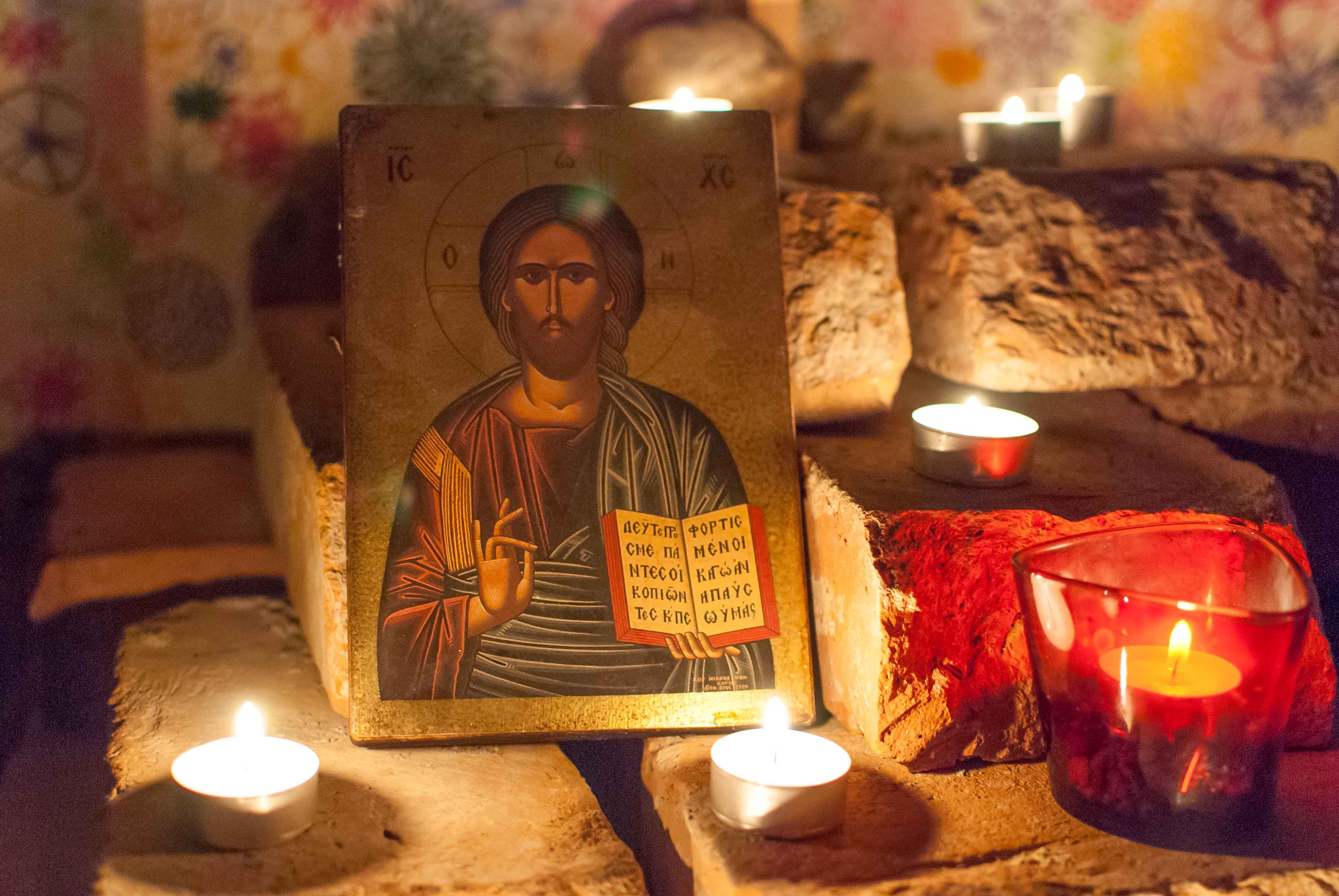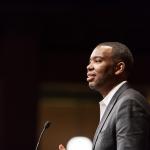
This is the seventh in a series of posts testifying about my conversion to liberation theology. For previous posts, here are the first, second, third, fourth, fifth, and sixth.
By the time I started reading Žižek, de Certeau, and Freire in earnest (thanks in large part to the influence of Sam Rocha), I was in the Eastern Catholic catechumenate. As I’ve written many times on this blog, I had encountered the Eastern Catholic churches during the Umbrella Movement because our Vancouver solidarity prayer movement was led in large part by an Eastern Jesuit.
But as I wrote two days ago, the Umbrella Movement also jammed my writing. On an impulse, I had aligned with the oppressed in Hong Kong, but that meant giving up a kind of politics of ‘harmonious communion’ in which I could see things from everyone’s point of view. One of the most honest reasons I became a catechumen, then, was that I was paralyzed in my work. I felt perhaps that I had a spiritual problem. Because of this, I thought I might benefit from some spiritual direction from the Eastern Jesuit. I had read about spiritual direction from Anglicans, of course – the texts were Susan Howatch’s Church of England series, where the characters went through a number of sessions of what I’d describe as spiritual psychoanalysis to get themselves unstuck from their personal issues, especially sexual ones.
This led into participation in Eastern Catholic liturgies. It was completely unlike Anglicanism, because of which I could at least follow the Latin Church’s mass and could fool my Latin friends into thinking that I was more Catholic than them. I could not follow the first liturgy I attended. Also, everyone sang out of tune and it sounded really like a bunch of unmusical peasants. One woman in the congregation in particular had a habit of singing so that when she went up for a high note, she’d hit something within the vicinity of the right pitch, and she would do likewise when she went low too. But at the same time, there was a lot of incense, the priest was vested very formally, and there seemed to be some attempt at glory. As I described it then, it was so bad that it could possibly be good.
In spiritual direction, one of the writing problems that I brought up – and some of the congregation members had the unfortunate pleasure of hearing about this too – was an article that never got published because it was for a failed special issue on urban religion and the ‘new materialism.’ I thought I had always been doing a ‘new materialism’ because Milbank and his gang of radically orthodox theologians always spoke about the Eucharist and the practices of the church as a ‘materialist’ practice infused by the supernatural. But the criticisms of my article always circled back to why I didn’t talk about ecology, and eventually, I discovered that I had been completely naïve and that the ‘new materialism’ was a kind of ‘posthumanist’ attempt to talk about the agency of non-human matter. In this vein, a ‘postsecular’ vein of new materialism is when you have faith that despite the colonization of the natural world by human activity, nature will finally win out because it’s still alive – or as they put it, the vitalist forces will triumph in the end.
I was troubled by this, and I tried to explain it to the Jesuit who became my spiritual father. I didn’t know how to read him at the time, though, and just assumed that he’d be anti-materialist and anti-Marxist, because that’s what I had come to expect in my interactions with Catholics and Orthodox who despise communists. I said, then, that I was trying to write as a Christian, which meant I couldn’t be a materialist, and maybe that was why I was struggling.
But then he replied: But I’m a materialist.
I thought that what he meant was that he was materialist in the ‘radical orthodoxy’ sense, and I played along until he told me something profound. He said that in Jesuit formation, he had read plenty of phenomenology and materialism, and he came up with two theses that changed his life. First, everything that is real is material. Second, if God is real, then God is not. This was a little weird. Did he mean that he was an atheist? Was he flirting with death-of-God theology, which was cool in Žižek, but probably not kosher in Eastern Catholicism and Orthodoxy? What was he talking about?
It took me my entire catechumenate and some of my mystagogy to wrestle through what he meant. It turns out that it is very similar to my new intellectual orientation now. In my reading – and here I may be putting some words into his mouth, so this is probably more me than him – what he is saying is that the things we encounter in the world, including many of the issues that cause us problems, are material: you can find them attached to some concrete thing, place, and institution. However, for many spiritual directees (myself included), we invent all sorts of fantasies to mystify those relations, and some of these phantom thoughts are even couched in theological language.
He even went as far as to say that it was indeed the case that most Eastern Catholics and Orthodox, as well as the Latins, hate communists for the oppression they perpetrated. In fact, this is why our temple also holds services in solidarity with Tiananmen and the Umbrella Movement, and we talk about how the Kyivan Church rose from the dead after being liquidated by Stalin. That said (he continued), Marx probably has the best analysis of how these kinds of fantasies work. Marx actually calls these fantasies and fetishes ideology, the kind of thing that makes the working of capitalist circulation invisible by distracting your attention through some concocted mythology. That’s why we sometimes try to find ‘God’ in the midst of those material problems, as if he were directing those institutions or that he is even at work in them to shape our lives into his image and likeness (which turns out to be the institution and likeness of the institution, not God). But God, being G-d, is outside of this materiality because he created it, and while he might infuse it with his graceful presence, he is not material. As our Lord Jesus Christ says, God is spirit, and those who worship him must worship in spirit and in truth.
Is this not the deeper impulse beneath liberation theology? The critique launched by a number of theologians of liberation is that much of what passes for theology are top-down institutional doctrines that do not connect with the material lives of believers. The point of liberation theology is for ordinary Christians to work out from their actual conditions what they are actually going through. From seeing, then they can judge the situation theologically, to recognize the spiritual dimensions of the material reality that is going on. Then they can act in a concrete situation. In this way, theology is not something that is imposed onto people; that’s ideology. Instead, the speech of God comes out of the prayers of the people as it is worked out in their everyday lives, conscious as they are of the oppression they experience in the world and struggling in a truly spiritual way for liberation through the God who saves them.
This, in a word, is liturgy. When I asked my spiritual father explicitly about liberation theology, he replied that during his formation, he had written a paper on theologies of liberation within Byzantine liturgy, especially in the Lenten Triodion, the service book for the Great Fast. He went to retrieve his copy of the Triodion, and through the session, he read passage after passage about how the church aligns with the poor and cries out for liberation as part of the people.
But there is even more to it than that. As I participated more in the liturgy, I began to realize a few awkward realities about liturgy in our church. The most important thing to note is that the priest is not leading the liturgy, calling back and forth between the congregation and himself. The priest tends to be stuck behind the icon screen, and as much of what we do down below is to cover up his presbyteral prayers with our singing – say, during the singing of the tropar, Kondak hymn, and theotokion after the Little Entrance, or the Cherubic Hymn that covers up the consecration before the Great Entrance, or the communion verses that cover up the communion of the clergy. During those moments, we are technically on our own, which means that we technically have to lead ourselves.
No wonder, then, that my spiritual father told me throughout my catechumenate that the most important part of learning about Eastern Catholicism would be through attending liturgies not just on Sunday, but also at the All-Night Vigil on Saturday evenings and the various special services on feast days and during fast seasons. The only way to really get into the guts of this church is to be part of the people in a literal way. As the people, we are enacting a space in which the reality of the supernatural that was always already there is made palpable; in this, the yoke of oppression is loosened, and as we sing in the Cherubic Hymn, we ‘now lay aside all cares of life’ – to move from being conscious of the oppressive forces in our everyday lives and to claim the spiritual reality that transcends them in and through the material work of the liturgy. But this does not mean that we always do this well – because we are the people, everybody is singing, including and especially people who are not musically trained, or those who were exposed to musical training once upon a time but are really bad at it now. It is in upon the praises of ordinary folks who sing so badly that it might even be good that the Lord is enthroned.
In my conversion to Eastern Catholicism through my need for spiritual direction, I thus began without knowing it a kind of praxis of liberation theology through which I began to learn how to distinguish between fantasy and material reality in my participation in the liturgy. The question, then, is how this relates back to my actual work in everyday life: writing. For that, I turn next to Asian American studies in my work at Northwestern University, where I wrestled with the teaching of liberation theology and the communication of my praxis in a completely secular environment.












